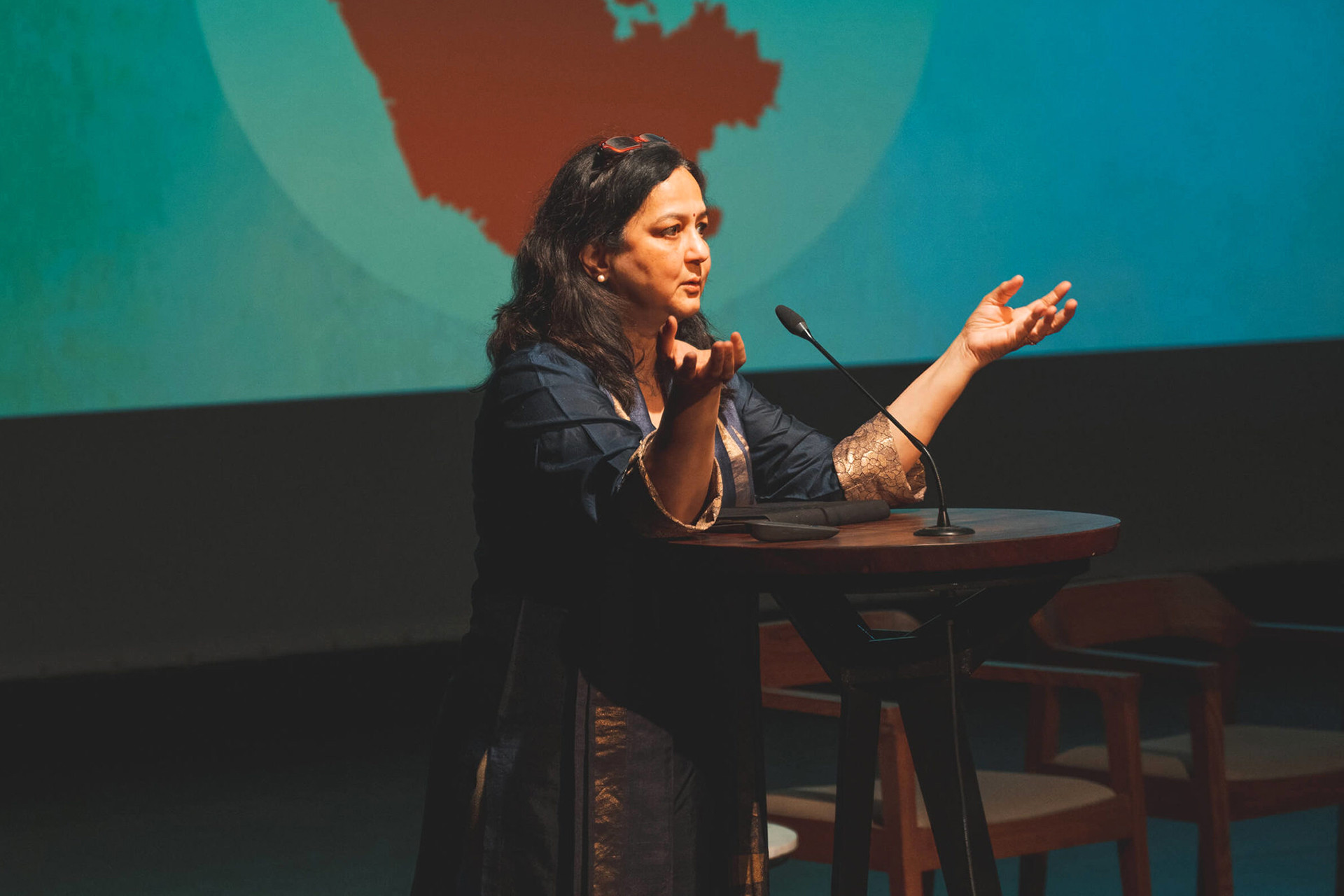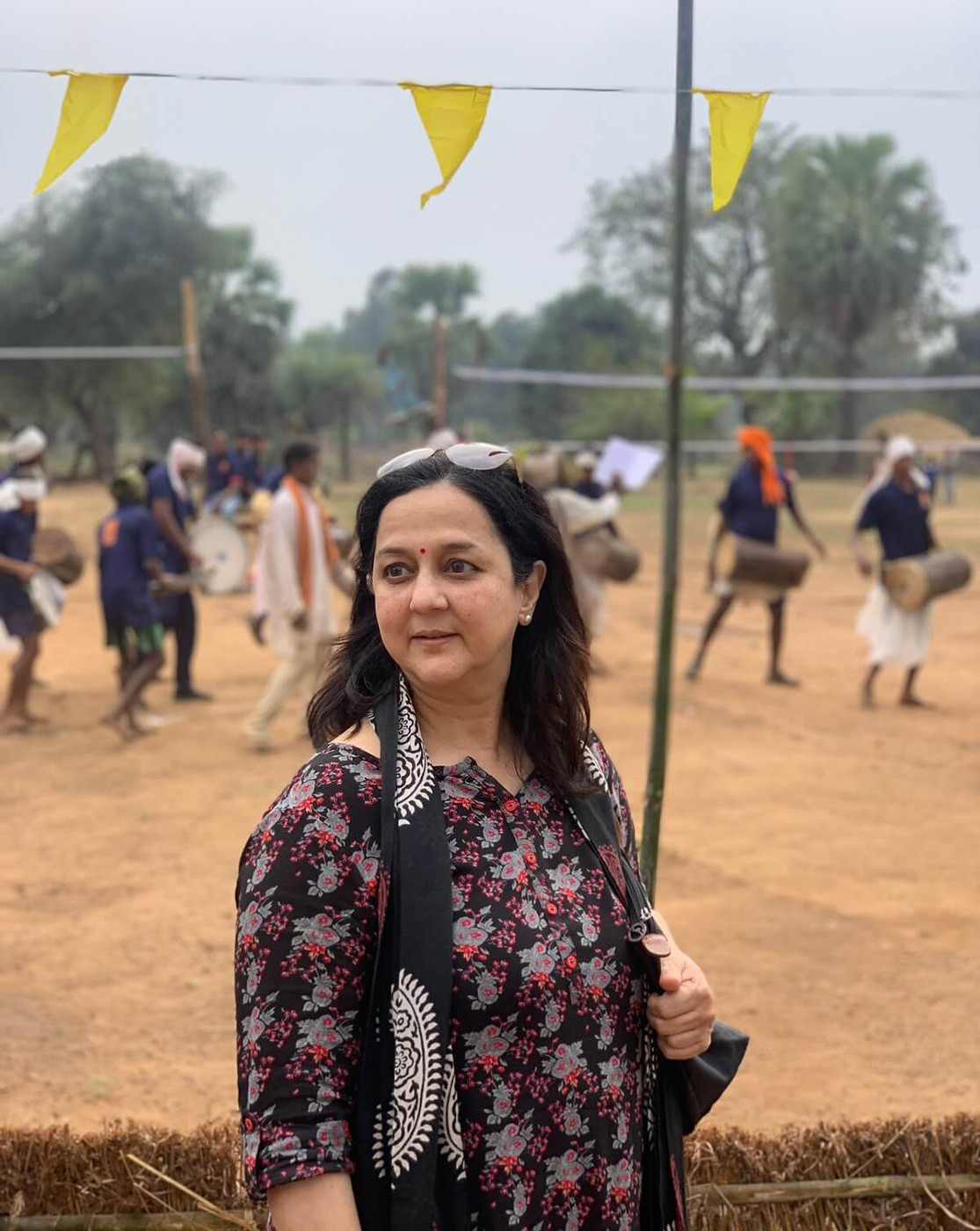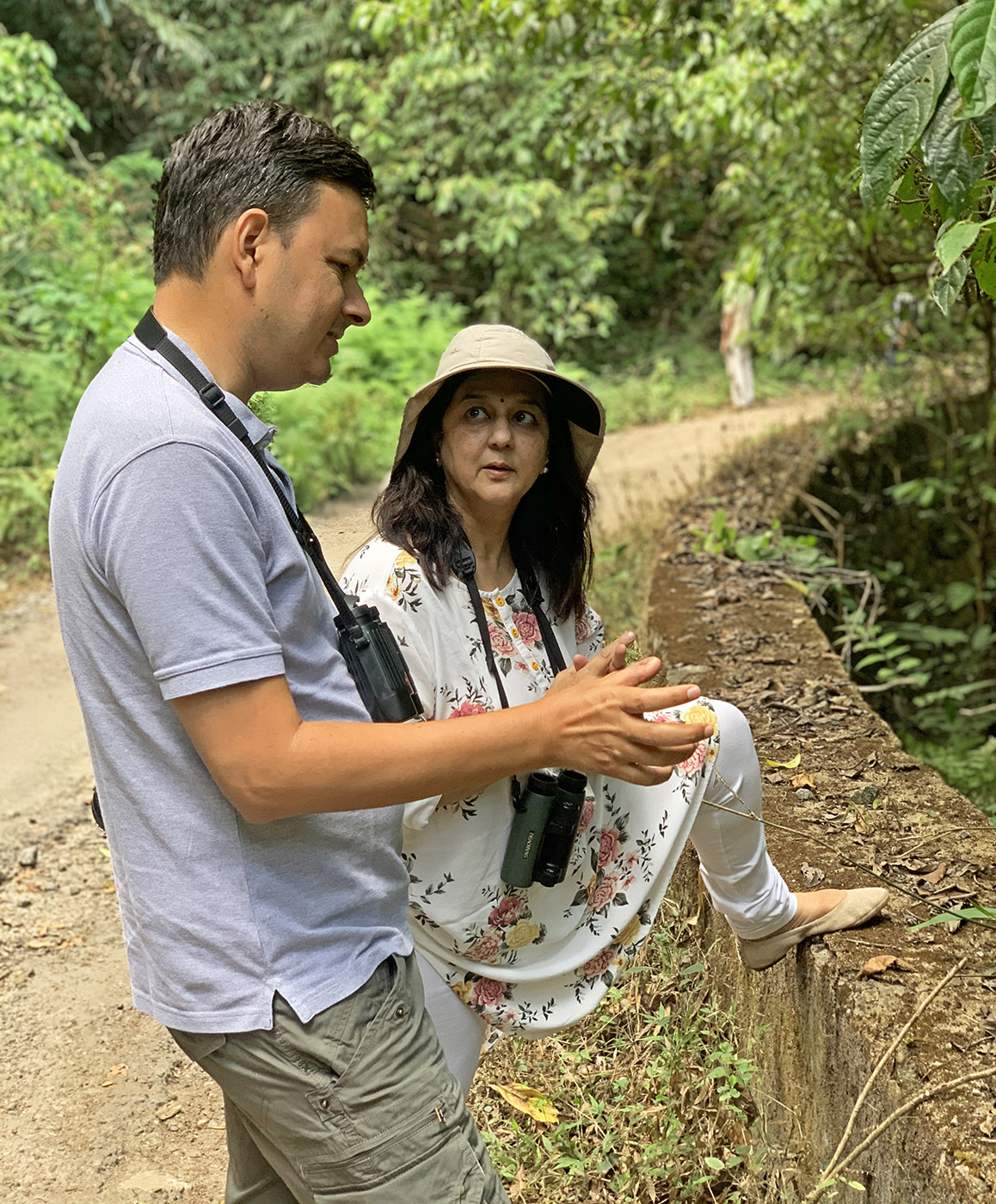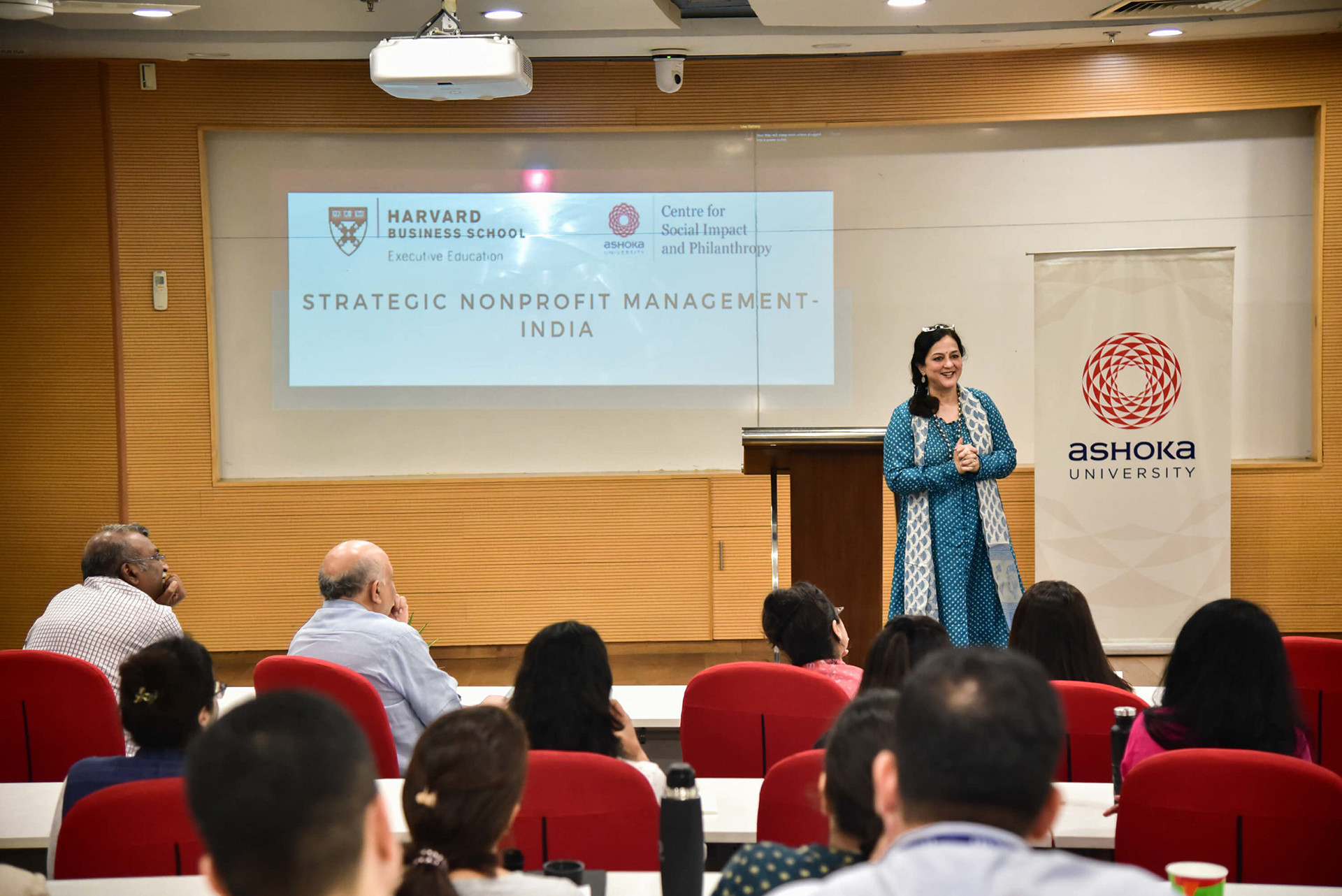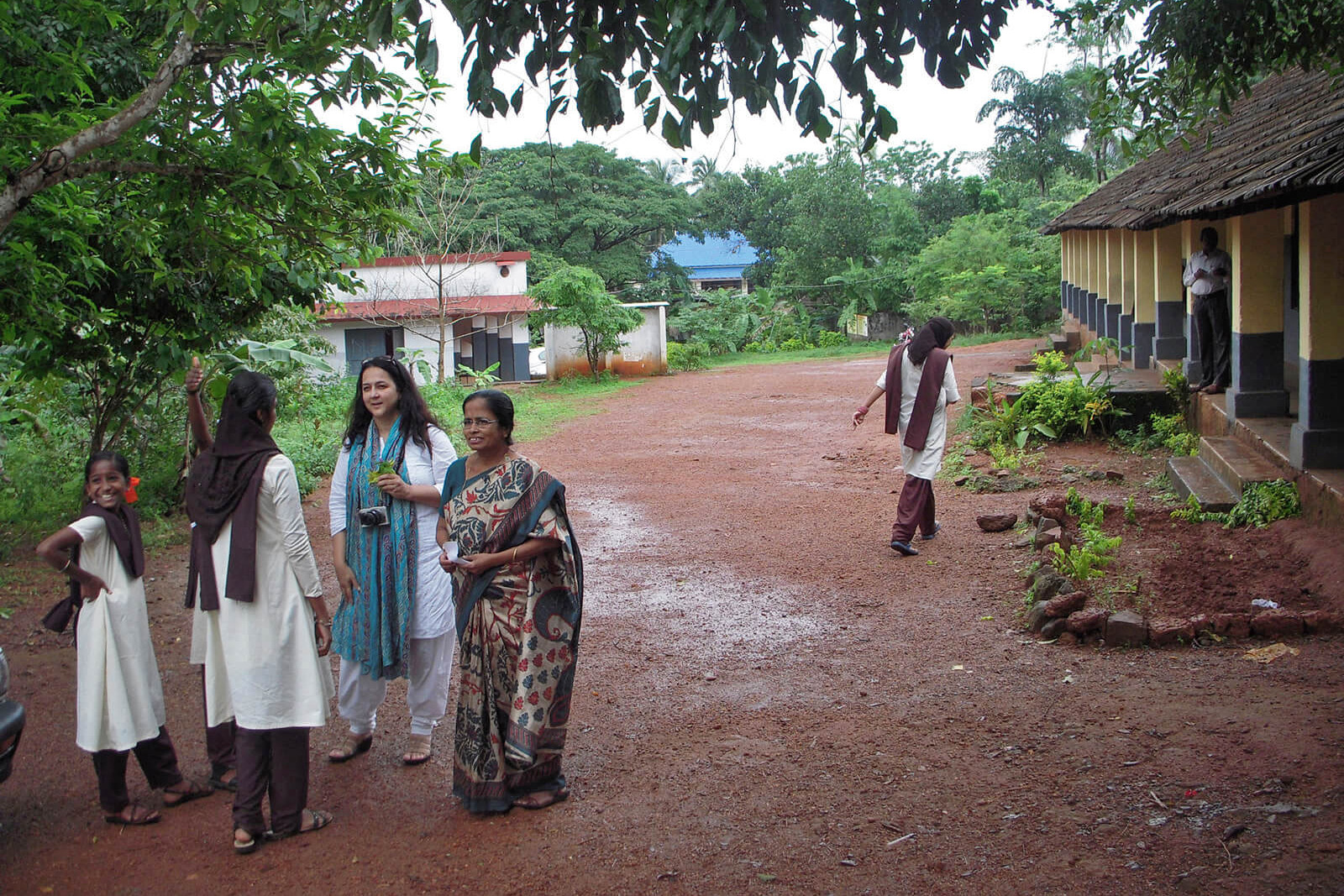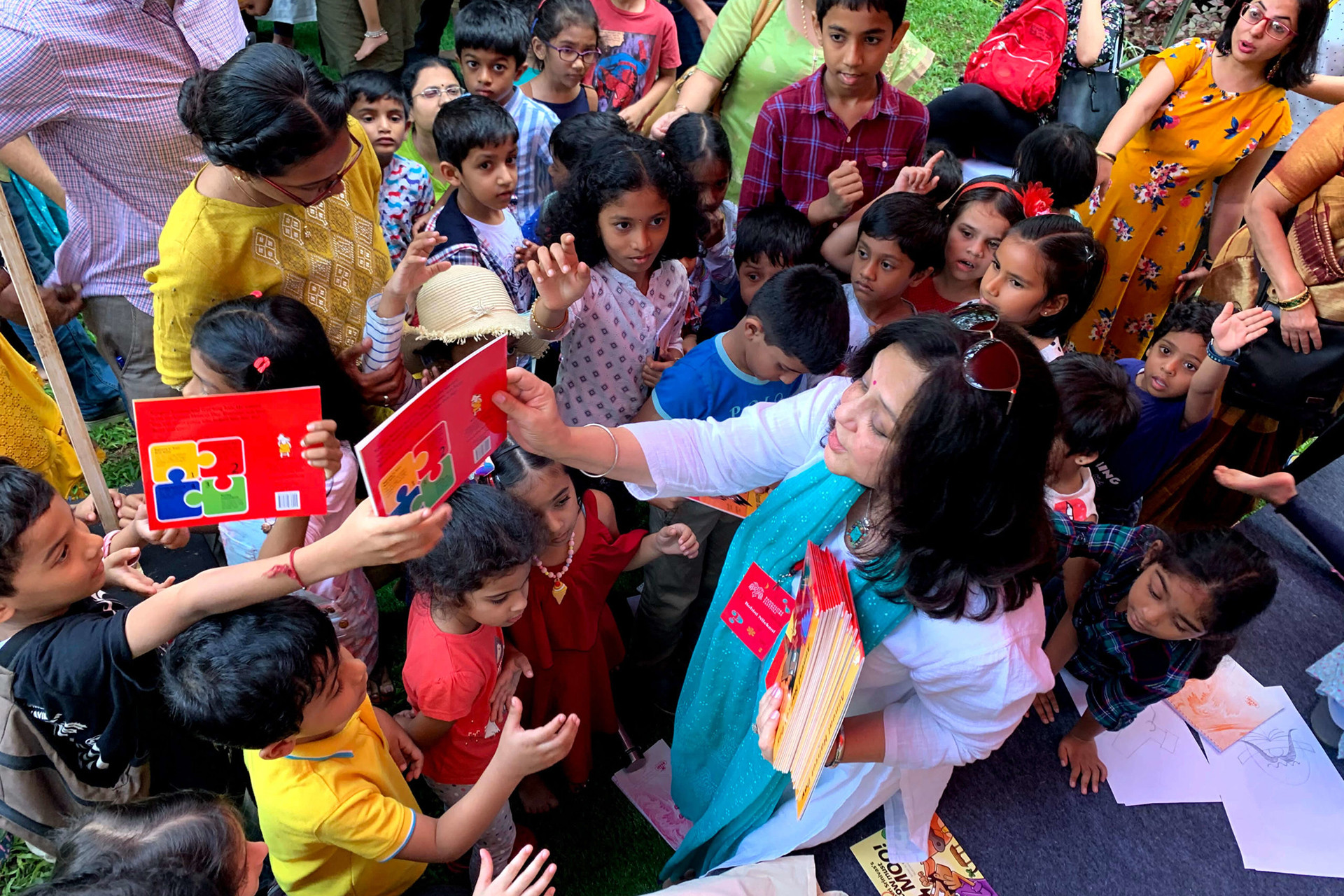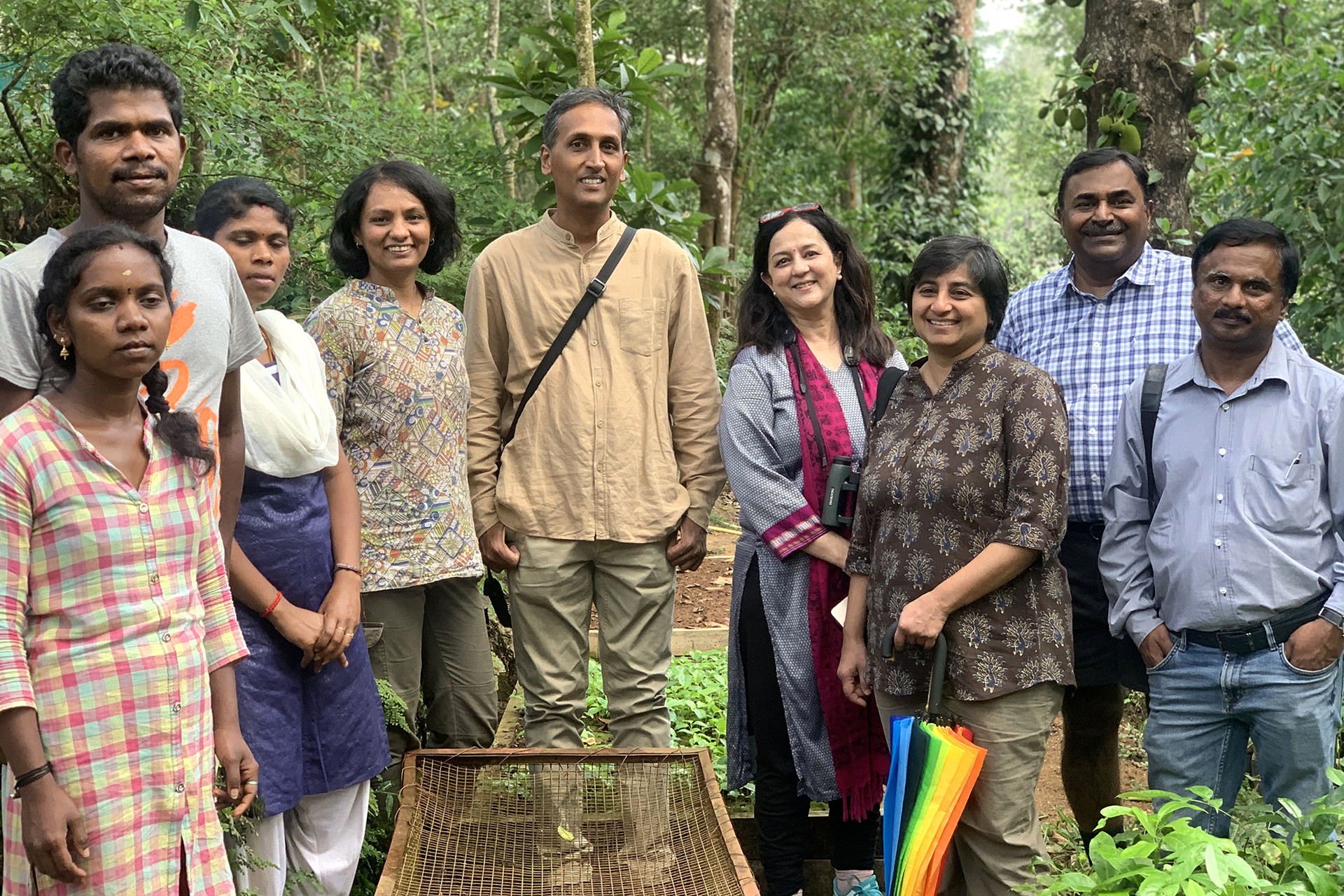Once you have become curious, once you have become connected – remain committed. This is a long journey. We need perseverance.
Rohini Nilekani is easily one of the biggest names in Indian philanthropy, though she will strongly disagree. Her work over the last two decades has been instrumental in bringing meaningful socio-economic and developmental changes in our societal and natural landscape. A former journalist, author of fiction, non-fiction and children's books, she is a Foreign Honorary Member of the American Academy of Arts and Sciences. Nilekani and her partner Nandan are signatories of the Giving Pledge and have committed half their wealth to philanthropy.
She is the Founder of Arghyam, a foundation working towards sustainable water and sanitation across India. From 2004 to 2014, she was Founder-Chairperson of Pratham Books, a non-profit children’s book publisher. She is the Co-founder-Director of EkStep, a non-profit education platform. She sits on the Board of Trustees of ATREE, an environmental think tank. The list only gets longer.
Rohini Nilekani is among the few philanthropists who have dedicated their efforts towards the natural world and its protection. Nature inFocus Founders, Rohit Varma and Kalyan Varma caught up with Nilekani on a Zoom call to chat about her love for the environment, her water conservation efforts and much more.
Here is an edited transcript of the interview.
Rohit Varma: Thank you Rohini, for joining us today. For the audience, Rohini Nilekani does not need an introduction. I am just attempting to talk about her philanthropic work, which she has been doing for a very long time. She is passionate about nature and wildlife and spends a lot of time outdoors herself. Today’s chat is about her journey and the work she has done with regards to nature and conservation.
Rohini Nilekani: Thank you, Rohit, and thank you, Kalyan. It is an honour to be here with like-minded people. Thank you for the opportunity.
Kalyan Varma: Great to have you Rohini. A lot of people know about your foundation and the work that you do. A big part of what you do is related to environment and conservation.
Kalyan: Where did your love for the environment start? What made you focus your efforts towards this sector?
Rohini: Thank you. I was born and brought up in Mumbai. I was born in ‘59, and my childhood was during the 60s. It was very urban. In those days Mumbai was not as dense as it is now, but even then we did not have too much wildlife around. Inside my house, my parents would get rid of any potential wildlife. They would use flit cans and kill every cockroach, ant and spider. However, all our holidays were spent in my grandparents farm in Dahanu which is in the northern part of Mumbai, on the coast, among chikoo and mango orchards. There, I got to experience nature. In those days, there were no seat belts and we used to go out in open jeeps. It was densely forested all around. We would sleep outside, under a canopy of stars. I think that's when I learned to not just love nature, but also understand its relevance to human well-being, even as a child. So, that's how it all began. As a journalist I did some environmental writing, because Bombay was always tussling with environmental issues. As a reporter for Bombay Magazine, I got to cover some of that.
As I started doing my philanthropy work and while working with organisations like ATREE, of course, I went much deeper into issues of biodiversity, conservation, ecology and all the challenges therein for India and the world. And climate change has now made everyone an expert on all things to do with the environment. So, that's the short history of my journey into conservation.
Kalyan: One thing that Rohit and I have seen first-hand is your search for the black panther. I was fortunate to be there when you saw your first black panther a couple of weeks ago. We also heard your passionate talk about it. So, how was it seeing it in person?
Rohini: After five years I got a call that he is there and you just have to come – something I have heard many times before and nothing has happened. I was 100 per cent sure that as soon as I reach the bend, Blacky was going to come down and disappear. But, this time he decided not to, and actually what saved me from one more disappointment was the tiger that was in the bushes on the right, so Blacky did not want to come down. I finally got to see him. I must say it was quite a moment for me and I shed a few tears like in the Hindi movies. All I could say was – thank you, he really is so gorgeous.
Rohit: You spent five years looking for the black panther?
Rohini: Well, not all five years. Everytime we went to the forests we would look, and this last year was an intense search for Blacky. He finally revealed himself to me only after I made a public confession of my love. I think he was waiting for that.
Rohit: Which is your favourite wildlife sanctuary?
Rohini: India is so blessed! There are so many places in the country – you can go to Sikkim, Kaziranga; I haven't travelled in Madhya Pradesh properly, but there is also Ranthambore; all the places in Rajasthan. Even in Maharashtra, there is Tadoba. In South India, there is Wayanad, and so many other places in Kerala and Tamil Nadu. My favourite forest currently is Kabini. I think it is rocking. It has the best wildlife. You turn a corner and there is a tiger. The trees are amazing. Kabini is number one!
Rohit: In your talk at the Bangalore Lit Fest, you spoke about how the focus has to be on lesser-known species. How do you see that happening as most of the people are focused on talking about the large mammals and conservation efforts are also on large mammals?
Rohini: I think it is the responsibility of all of us who care about nature, who care about wildlife, who care about what is going to happen. How are human beings going to learn to live well on this planet? I think it is our responsibility to introduce (nature), especially to young people and urban people. Young, urban people are the first categories that I can think of where we get them as excited about seeing a draco or those amazing frogs or even spiders. I found a Tarantula in my room the other day in Kabini. The old Rohini would have screamed, but (now) I understand that the Tarantula also has a role to play. We gently took him and put him outside. It is up to us to share the story about interconnectedness – that a tiger cannot survive without everything else. If we don't tell those stories well, then obviously it is the charismatic, big, large, golden tigers that are going to capture [public] attention. The better we tell our stories, I think the faster this will change.
Kalyan: Talking about lesser-known species, Rohini, in one of the earlier works that you have done, from a decade ago, your focus was more on river systems and water systems in India. Again like lesser-known species, we also need to have a slightly larger habitat perspective on conservation. Why was your focus on riverine systems and how did that fare?
Rohini: In 2005, Arghyam, the foundation that I started, began working on water with the mission – safe sustainable water for all – and by ‘all’ we mean not just humans, but all living species. While we focused a lot on human welfare, lifeline water and drinking water/public water, we were very aware that it ties back to rivers and landscapes. We did a lot of work on groundwater management, wetland conservation, drought proofing, flood proofing with some amazing partners that we have all over India. I must use this opportunity to say that in this whole field of conservation, whether it is about water, land, climate, biodiversity; there are many good organisations that one can work with. Without them, none of this is possible.
Right now, in the summer, we know what is going to happen to the forests when there is no rain – how dry it gets, how desperate the animals become. One real challenge for India is to manage its water resources better. We cannot produce more water even if we desalinate, and I won’t talk about the politics and the sustainability aspects of that. But, how does one manage, as a country, with the water that we have? I think we need to think hard on this. The forest department also has a role to play in helping the public understand the management of catchments. Through Arghyam we have been able to do a lot of work for the last 16 years with water as it is very very very closely tied to biodiversity, wildlife, and human well-being, obviously.
Kalyan: If I could ask a deeper question about that. Like you said, the forests are well-established, through the forest department, and we have protected areas and all that. But if you look at water systems, these are public areas and they don’t come under a single department. It is a shared resource.
Rohini: Comes under 17 departments even at the union level!
Kalyan: Exactly! In some sense we are heading towards a major water crisis in India. It is one of those hidden things that people don't talk about or see on the surface. You are from Bangalore, and we have seen how the groundwater level in Bangalore has reduced drastically in the last two decades. As citizens and as collectives, what is that we can do? If it is forests at least we know that there is the forest department whose mandate is to protect the forest and the animals, but with water it is our collective responsibility. As common citizens, what can we do?
Rohini: As individuals, as a community, as samaaj, as bazaar and as sarkar - all of us have a role to play in the conservation of water. At a personal level, we all know that we need to reduce our water footprint. And even then you find people saying, how does it matter if I keep the tap running when I am brushing my teeth? Perhaps it actually does not matter because eventually, the system is a kind of an urban cycle. But, it helps us to practice valuing water. When we remember to turn off the tap while we are brushing our teeth, if we are lucky enough to have running water, it helps us to understand and mindfully learn about water as a resource. Everything we do to put our mindfulness on the issue of water helps us to be much more successful as a community. Every single thing that corporations do to make sure that inside their fence and in their supply chain they are being more efficient – per unit of production – when it comes to water, is helping everybody. Of course, the government has a mandate; it is a lifeline resource. The government right now has undertaken two huge missions on water, and through the Jal Shakti mission, hopefully the lifeline water will be much more secure for people. We already have come a long way in the last few years. But yes, everyone has a role and we should not feel that what we do is never going to be enough. All of us should see that everything we do, does contribute, but without making other people feel guilty or using judgement. Sometimes that happens too. So, we have to be a little careful.
People need to understand that water is hidden in everything. (Picks up a book from the table) Water is hidden in this book, virtual water. God knows how much of the forest they needed to make this marvelous but very thick book. Water is hidden in everything – everything that we consume or use has a water footprint hidden in it. I think the younger generation understands these things more than we did when we were young, and you are much younger than me. That consciousness is coming in, but people like us have to keep telling those stories, and try to be better examples. My generation has a lot to account for, that's for sure.
Rohit: Don't you think that your generation, or our generation or the coming generation – we have all taken nature for granted. We have not valued what nature gives us, and I feel that we have been disconnected from nature and not understood its importance in our lives. We believe that there are two different worlds. There is a world with wildlife in it and there is a civilised world. That disconnect has created humongous problems. When you talk about climate change, I believe, this is one of the main reasons why the problem has become so huge. I think that over a period of time, more and more people need to start getting that connection back with nature. Organisations like yours or Nature inFocus or many others have to play a huge role in building that connection.
Rohini: I couldn't agree with you more. There is a lot of work to be done with young people and urban people. Look at the public spaces in urban India; where is the opportunity to reconnect with nature even if you wanted to? 2020 has allowed us to reimagine our public spaces. It will not be the last pandemic, nor was it the first. It has given us the opportunity to rethink how we connect with nature. During the lockdown, 30 per cent of fossil fuel reduction happened for a short while. It bounced back, but because people did not use cars, people got to walk and breathe cleaner air. I disagree with people when they say this is an elite issue. People living in slums getting clean air is an even bigger issue than me getting clean air. It allowed us a chance to reimagine. It is now up to civil society and academia to keep the conversation going, so we don't go back quickly to being disconnected again.
Rohit: Don't you think that is happening right now? When the lockdown happened everybody was talking about how nature is healing; nature is coming back. But now people have gone back to their normal lives. They have forgotten about nature again.
Rohini: Well, I don't think so. I meet so many young people interested in looking for alternative futures, because they are going to inherit a terrible future and we are seeing that. Climate change is already here. I prefer not to be foolishly optimistic, but to have hope and be realistic about the fact that when people see themselves in a crisis because of abuse of water, land, carbon, they are going to change. Just like people learned to wear masks within one month. Maybe not everybody, but we always said that humans can't change, and we proved in 2020 that humans can change. So I don't think we should lose hope for young people; I know I keep saying ‘young’, but that is because they are going to be at the edge of the environmental crisis. I think they will be forced to innovate out of it, which might mean that they will be less dependent on fossil fuels. I also see in western countries, and I may be wrong, the emergence of a post-consumption generation, one that is less interested in buying their 17th t-shirt and their 45th – I don't know in the old days we used to buy DVDs – something like that. I see them more interested in other things. In the olden days, if they had 100 rupees they would spend that on 10 or 15 things, but now they are looking consciously to spend that money in ways that are less abusive to the planet. I feel if such a leading generation makes itself visible, others may follow.
Kalyan: Since we are talking about the next generation, one of your earlier initiatives has been with Pratham Books. It is fascinating. I have gifted all those books to my nephews who love it.
Rohini: Thank you so much!
Kalyan: Because of those books they turn around to their parents and ask – Why are you doing this? Why are you not doing this? So ours is a lost generation...
Rohini: Not you, you are much younger than me, you can't say that about yourself (laughing). You have a lot of work to do.
Kalyan: For the next generation – 30/50 years from now. And I am not just talking about the urban elite who have access to everything, I am talking across the board. How do we get them to look at the environment as a whole – from water to air pollution – how do we get them on board?
Rohini: I think school matters a lot. Using EVS (Environmental Studies) as a compulsory subject; how can we enrich what they learn there? How can we give more hands-on practice? Does not matter where you are. Even if you live in an urban slum, there is going to be wildlife. Even if you are a child of the Jenu Kurubas (honey gatherers) around Kabini, for example, then you have it all around you. You need adults to make sense of it, apart from your free exploring. So then what happens in schools matters, what happens in your home matters a lot more. Of course, there is also arts and culture. I mean, what you are doing – the documentation that you are doing, the stories you are sharing, what our amazing wildlife documentary makers are doing; there is so much creativity we see now. Those stories are important. Performances are important – right from street theatre to stage dramas. That's how you reach kids. This is an ongoing, ongoing, ongoing effort. Now some interesting market interventions have come in. People seem to love outdoor camping; those who can afford it. They like to go out into the wild. Forest tourism has increased. People are getting it, but these changes are slow. Our job is lage raho Munna bhai! You keep telling your story, keep telling your story, find new audiences, keep sharing and be as honest as you can about it. That's all we can do.
Kalyan: You have watched Wild Karnataka, and so many children have written to us saying we did not know that Karnataka had so much wildlife. They want to see the crabs and the dracos.
Rohini: Exactly, once you unlock these treasures to people, they want to discover it themselves. That's why I said your storytelling is such an important part of sensitising the next generation.
Rohit: As we are talking about the next generation, would you like to give three or four points or things that we can do to make sure that we are able to conserve what we have and better the current status of the environment or the Earth. A three-pointer agenda that we can drive and the whole world can drive.
Rohini: I tend to tell young people to stay curious – which means always keep your minds open and acquire new knowledge about how we are all so interdependent. From the ants and the spiders to all the germs and bacteria on our skin. Remain curious about that.
Secondly, I would say, remain connected. Once you have that curiosity, you will develop an understanding. So the second thing is – remain connected to the issues that you have understood. I mean that these are all economic, social, political issues of the environment. Don't hesitate to connect with them. Even if it means understanding laws, how they affect you, how they affect the places around you, habitats around you – stay connected.
Once you have become curious, once you have become connected – remain committed. This is a long journey. We need perseverance. We cannot be disappointed by two or three things and step back. We have to keep walking to go forward. This is right now the only planet that we can inhabit. We know that we need to heal it, to regenerate it and by doing so we regenerate ourselves. So stay curious, stay connected and stay committed. These are the three things that I would like to say.
Rohit: That's perfect. Just perfect. It is very important for people to understand what they can do; even children need to understand that. That's a larger problem. There are several people who love nature. They would like to contribute. They would love to do something about it. They just don’t know what to do. What to do is a big part of the problem.
Rohini: There are lots of organisations. Just connect to one issue and one organisation. Take one step and that will lead you to the next step and the next step. And also in the process, please everybody have lots of fun. Because it is fun. You can rediscover that wonder by reconnecting with our environment. It is a lot of fun and joy and gives absolute fulfilment to the heart and the head.
Kalyan: Great! One last thing, Rohini. Coming back to your philanthropy efforts. You have been instrumental in funding a lot of NGOs like ATREE, NCF...
Rohini: Keystone, ATREE, NCF, Dakshin, I have forgotten as there are many.
Kalyan: They are instrumental in understanding and trying to come up with solutions for the environment. If I look back in India in philanthropy, you are probably number one when it comes to funding the environmental spaces.
Rohini: That I am not sure. There are lots of others, that's not true so let's not go there. I am an enthusiast.
Kalyan: What's your message for other people and industrialists, because these organisations do need money at the end of the day. Nothing moves otherwise. A lot of people donate towards education and healthcare, which are again very important, of course. But how do we get people to fund environmental causes and grassroots organisations?
Rohini: Thank you, Kalyan. That is a good and important question. I now know a lot of the environmental organisations in India. I also know, and I am going to be frank here, there are a lot of hardcore positions that organisations can take. Sometimes we see a lot of clash amongst environmental organisations on several issues, which at times becomes public. For example, one of the big issues is that some people believe we can only conserve our forests if we remove human beings from there. Some believe that there is no way we can conserve our forests if we don't have human eyes watching, or being part of it because we are a part of nature. Without commenting on my position on the issue, the point I am trying to make is that civil society organisations working with the environment need to come to some kind of common platform, where you can tell your stories without bitter battles, and those stories reach the people who have capital that they want to put into this. There are a lot of people, but they get confused about what issues to support and how to support them. Some kind of platform is necessary for all of you to think about it. I know people who will be watching this will be in that space. What can you all think of to come together, so that when philanthropists gather, between them and various organisations we can create bridges? We can bring forward some stories. I think that is very important.
For many years, foreign organisations were funding this space to some extent. I am very glad they did, and we thank them a lot. It is now time to draw in some Indian philanthropic capital. For that, we must make sure that we don't hesitate to reach out to the Indian wealthy. We have to reach out to them without putting ideological barriers over our eyes. Can we do that? Can we open ourselves to tell stories to those who really want to do something but may not have connected all the dots? Each one of us is in our own evolutionary path. I think the time has come – to reach out, to create spaces, to bring your stories to the wealthy of the country, who want to be more philanthropic in the environmental space. I hope that all of you will start your internal dialogues on this, and in whatever way I can help, I will be happy to help.
Kalyan: Thank you, Rohini.
Rohit: Thanks a lot, Rohini. It was lovely having a chat with you. Thank you for giving us the time.
Rohini: Thank you so much. I hope it was useful. Thank you for the opportunity, and hope Nature inFocus meets physically next time, and I am coming!
Kalyan: Of course!
Rohit: We would love to see you there.
